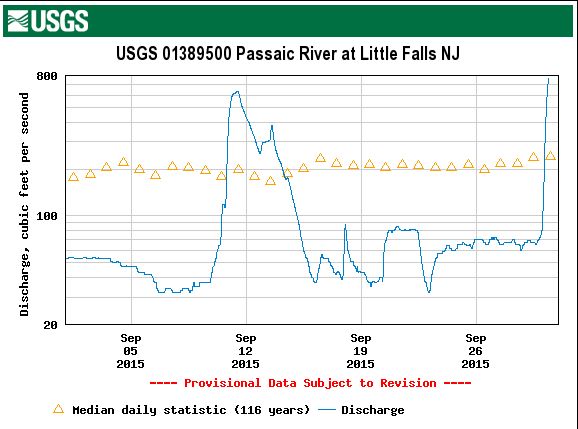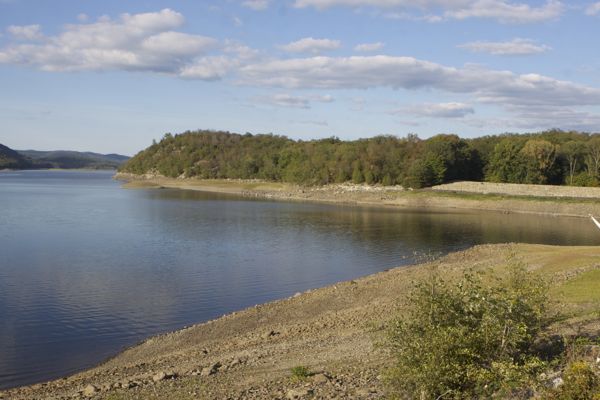DEP (*Permit condition) Ordered Halt to Pumping River Water to Fill Wanaque Reservoir
Drought Meltdown Scenario Begun in North Jersey
Critical Low River Flows In Passaic Basin – Declining Reservoirs
[*Clarification: 10/2/15 – Technically, DEP did not issue an enforcement “order” to stop pumping. A water allocation permit limit was the mechanism, based upon a passing flow requirement in the river. Unclear whether the permit limit was self enforced or DEP permit or enforcement staff conducted oversight and contact NJDWS based on low flows.]
The DEP just ordered a halt to pumping of the north jersey rivers to replenish the Wanaque reservoir. Here’s why that’s important.
As we’ve written, north jersey lacks adequate reservoir storage capacity and therefor must rely on Passaic basin rivers (Passaic, Ramapo, Pompton rivers) to pump water to fill the reservoirs and to take for direct water supply. Some reservoirs lack adequate natural watershed drainage in order to fill and require river pumping to be filled.
There are limits to how much water can be pumped out of rivers, to protect the aquatic life and ecology in the rivers and to protect public health.
Those limits are called “minimum passing flow requirements” that are set by NJ DEP – see this for a good primer on these minimum passing flows set by DEP. This sums things up:
… Modification Of Dilution Passing Flows
Assimilative capacity is the ability of a natural body of water to receive wastewaters or toxic materials without harmful effects. Some passing flows are set based on the need for sufficient assimilative capacity at a downstream point to meet a set standard. If the waste load increases or the water-quality standard becomes stricter, the passing flow may have to be increased. If the waste load decreases, or the water-quality standard is relaxed, the passing flow may be reduced without causing a violation of the standard. This highlights the interdependence of water quantity and quality.
… Relaxation of Reservoir Passing Flows During Droughts
A reservoir system’s safe yield is that volume of water it can reliably deliver during a repeat of the most stressful conditions yet experienced. Reservoirs with a minimum-release or minimum-instream passing flow must release water to the stream and this can decrease storage during a drought. As an additional safety factor, some reservoir passing flows are reduced during a drought, providing an additional margin of safety. …
Preservation of Water Quality
Treated wastewater is routinely discharged into the surface waters of New Jersey. This activity is highly regulated by the U. S. Environmental Protection Agency (USEPA) and NJDEP. The discharges may not cause a violation of surface-water-quality standards. The allowable waste loads are calculated as a function of streamflow volumes, quality of the effluent and the receiving water, and the surface-water-quality standards. The allowable load is usually calculated assuming a representative low flow. If flows decline below the design flow then the discharge may cause a violation of water-quality standards.
(note: the “highly regulated activity” does not include EPA and DEP pollution discharge permit limits on all chemicals known to be present in wastewater. These chemicals pass through sewage treatment plants and are discharged to the river. They wreak havoc on aquatic life – e.g. endocrine disrupting compounds cause things like dual sexed fish – and are threats to public health. The wastewater dominated flow of chemical laced water is then taken from the river for water supply. Unless it is highly advanced – and even advanced treatment is not 100% effective in removing all chemicals present – the treatment at the drinking water plant does not remove all these chemicals, many of which are not regulated or even monitored for, and they pass through treatment directly to your tap. These are the issues DEP glosses over and downplays the risks of in the above excerpts.)
The nightmare drought scenario is lack of rainfall takes the rivers off line and the limited fixed capacity reservoirs are depleted. At some point, without rainfall, north jersey could literally run out of water.
As we warned, that nightmare scenario began in September –
Today, the Bergen Record story buries that hugely significant lede, revealing that critical fact towards the end of a story that optimistically suggests the current storms will alleviate the drought:
But because flows in the Pompton, Ramapo and Passaic had become so low in recent days, the commission was forced under state regulations to stop pumping, said commission spokesman William Maer.
The fact that DEP ordered a halt to pumping from the rivers to replenish the Wanaque reservoir is a very big deal, particularly given how low that reservoir is.
DEP halting of river pumping and the depletion of the Wanaque will force reliance on the Monksville reservoir, then inter basin transfers. We are in an extremely serious situation.
If the storms that are forecasted bring 5 or more inches of rain – which would cause widespread flooding – we may dodge the huge bullet of the drought meltdown scenario –
Instead of The China Syndrome, let’s call it The Sahara Syndrome.
End note #1: What explains the dramatic increases in river flows around September 9 and September 28?
Are those increases related to the end of pumping? I don’t recall any rainfall during this time.
[End note #2: meanwhile, ignoring the above kind of problems, NJ’s conservation and environmental groups are doing stuff like planning festivals and promoting “sustainable” rain barrels. Their Foundation funded retreat from scientific and regulatory reality on major issues of water, air, land use, waste/materials management, and energy/climate is shameful. ]

